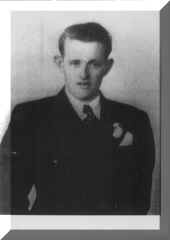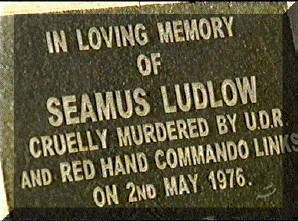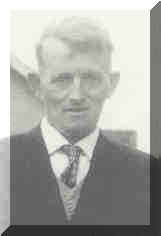


The Murder of Seamus Ludlow in County Louth, May 1976. Towards a public inquiry?
  
The Murder of Seamus Ludlow in County Louth, May 1976. Towards a public inquiry? |
|
A Fresh Inquest for Seamus Ludlow On 3 July 2002 the Office of the Attorney General in Dublin wrote to the Ludlow family's solicitor with the pleasant news that there was going to be a fresh inquest into the death of their late relative Seamus Ludlow. The original inquest of 19 August 1976 was an unsatisfactory affair conducted in the absence of the Ludlow family. There was no reference to the ballistics and forensic reports that were available at that time, and the Ludlow family heard no more information than was available in the local press.
The original inquest was described as follows by Jane Winter, Director, British Irish Rights Watch, in her independent Report on the Death of Seamus Ludlow, which was published in February 1999:
Speaking to the Dundalk Democrat, 20 July 2002, Seamus Ludlow's nephew, Jimmy Sharkey said the family were pleased to hear that there is going to be a second inquest and added that this time around, the family would be ensuring they will be fully involved. "We received confirmation from the Attorney General that the County Coroner, Ronan Maguire, has been instructed to proceed with a new inquest". Although it is not known yet when the inquest will open, Jimmy said his family did not mind a few months wait, after twenty-six years, to ensure that it will be fully prepared. "Two of the three bullets used in Seamus' murder were sent to Northern Ireland for forensic examination and up until last March hadn't been traced. One bullet may still be in the South, though its not certain. These bullets are going to have to be traced. "Also, the authorities never returned Seamus' clothes and so they should still be in storage somewhere". In the meantime, the Ludlow family are continuing to be involved with the private Inquiry being carried out by Justice Henry Barron. But they insist that both the inquest and inquiry will be dealt with as two different issues. As Jimmy explained: "it's twenty-six years since Seamus was murdered. Anything that comes along now can only help us. We see the inquest as yet another step, but we don't want a half-hearted effort. We want a fully-prepared inquest with all the information presented, including forensics and ballistics". What our friends said about this new development "Good news. Well done on your tenacity and hard work to bring it about. We've sent it for our site to highlight." Andree Murphy, Relatives for Justice This is extremely
good news I hope this will further your campaign for a fully independent
enquiry. "While the case of Seamus' murder will always be a source of deep sadness to his family, I am sure that this announcement is something of a relief. Ever since the "six to nine months maximum" 'Independent Commission of Inquiry' got underway into the Dublin and Monaghan Bombings in January 2000, your case was eclipsed. As the months have rolled into years, I could only imagine the frustrations you must have experienced. "It is so important Michael that you never give up on the right of your family to know the full truth about what happened on that terrible night in May 1976 to your innocent uncle Seamus. It is important that the agents of both the Irish and British States are made to account publicly for their actions and omissions which have caused you so much unnecessary distress and trauma." Don Mullan, author of Eyewitness Bloody Sunday and The Dublin and Monaghan Bombings. In March 2003 the Ludlow family was informed through an Irish News journalistic source that the Louth County Coroner Ronan Maguire was prepared to meet with the family shortly and that he was going to give access to the original Garda murder investigation files. These files were apparently quite extensive - amounting to some 100 witness statements - and the coroner was requesting further papers from the gardai before any inquest takes place. It was not immediately clear if the files include the RUC's 1977-1979 investigation file which identified the killers of Seamus Ludlow or the internal Murphy Report from 1998-1999 which investigated the original botched murder inquiry of 1976. When the garda files were handed over to the Ludlow family it was found that many pages were virtually illegible and that there was no sign of the vital forensics and ballistics reports. The file, which is now being carefully studied by the Ludlow family's lawyers, contained witness statements from various Ludlow family members, friends of the deceased Seamus Ludlow, persons who were with him during his last hours and various gardai involved in the murder investigation. At first glance there is little in the file that explains the gardai's attitude at the time. Nor is it explained why the original murder investigation was abandoned after only 19 days or why the gardai sought to deceive the Ludlow family regarding the suspects for this foul murder. There remain many questions that are left unanswered - for instance: where are the fatal bullets today; why was the original inquest held in secret with no involvement from the Ludlow family; and why were the killers allowed to go free? The following brief assessment of the garda file was made by Jane Winter, British Irish Rights Watch (BIRW), London, in her monthly Directors Report (31 March 2003): SEAMUS
LUDLOW At
long last the inquest papers in the case of Seamus Ludlow, cruelly murdered near
Dundalk in 1976, have come to light. We
believe that he was murdered by loyalists, some of whom were serving soldiers,
who came over the border from Northern Ireland.
The inquest papers have thrown up new leads in the case, which is
currently being examined by Judge Henry Barron.
Seamus Ludlow was a harmless man and an innocent victim who we think may
have made the mistake of accepting a lift from his murderers.
The older members of his family died without seeing any justice; we hope
that those who remain will not have to wait much longer.
By the summer of 2003 there was still no sign of a date for the proposed fresh inquest into the death of Seamus Ludlow. <Meanwhile, fresh inquests were announced, and quickly opened and adjourned, into the deaths of the 33 victims of the Dublin and Monaghan bombings of May 1974, and the deaths of three men in the Dublin bombings of 1972 and 1973. On 7 October 2003 the Irish News published a report headlined Coroner still awaiting copy of murder report which helped explain the long delay in opening the fresh inquest into Seamus Ludlow's tragic death. It was revealed that the County Coroner had still not received a vital copy of an internal Garda report into the murder investigation. Valerie Robinson,
the Irish News Southern Correspondent, reported that: "Co Louth
coroner Ronan Maguire yesterday (Monday) confirmed that he had requested a copy
of the 1998 report compiled by Chief Superintendent Ted Murphy. Here was an
admission that the Irish gardai were resisting access to important files that
were requested by the coroner, an echo of the obstruction from the RUC/PSNI and
the British Ministry of Defence that was being faced by coroners in the North of
Ireland, who were also trying to hold inquests after many years into the deaths
of victims of state killings in the Six Counties. The
Democrat continued: "Delays have been incurred in receiving relevant
information, but Mr Maguire has stated that he is still waiting on a particular
investigative report on the murder and a definitive explanation on the
whereabouts of Seamus Ludlow’s clothing and the bullets used." The Coroner was quoted: “I am still trying to trace the clothes although it is possible that they may have been destroyed, and I am still trying to locate the bullets and ascertain whether they are still in the possession of the Gardai. I would have thought they should be.” The Democrat report continued: "Seamus’ nephew, Jimmy Sharkey, has said previously that he understands two of the three bullets used in his uncle’s murder were sent to Northern Ireland for forensic examination, with one remaining in the South. He added that Seamus’ clothes were never returned to the family. "Photographs
from the murder scene which had been lost, have since been found and given to
the coroner. Ballistic reports have also been located." Mr Maguire told the Democrat that he wants to hear the second inquest straight through and that he does not want to see it adjourned. “I am not going to open and adjourn it. It will go ahead with as much information as I can get and I will hear it completely.” The County coroner said the original inquest of August 1976 had not heard from too many people. “Looking through the inquest file, there were only two other witnesses who were there for the purposes of identification. Obviously they were not family members as they had not been contacted. “There are also a number of files from people who saw Seamus Ludlow in Dundalk on the night he was murdered. "The inquest could go ahead before Christmas, depending on the family’s feelings. “Sometimes the families of the deceased do not want an inquest just before Christmas and if this is the case then I could be ready to go ahead with the inquest in early January.” The Inquest In fact, the inquest would face many delays before a date was set for the autumn of 2005. The gardai continued to appear obstructive in delaying the handing over of vital files requested by the coroner Ronan Maguire. The files, particularly the above mentioned gardai's internal Murphy files from 1998, were only produced when the coroner threatened to report this obstruction to the Attorney General. Still, there were conditions attached: the files were marked confidential and were not to be seen by the Ludlow family or their lawyers. It was agreed that the coroner could produce sections of the files as written submissions to the inquest. The fresh inquest began as planned on the morning of 5 September 2005 and was concluded on the evening of the 6 September 2005. The inquest attracted considerable interest from press and broadcast media. Disappointingly, the Murphy files remained hidden from the inquest and important information long demanded by the Ludlow family remains out of sight. The shroud secrecy and cover-up still remains hanging over the Ludlow family's search for truth. A jury of 6 men and four women at Dundalk courthouse unanimously returned a verdict that Seamus Ludlow's death was an Unlawful Killing, caused by gunshot wounds, with the medical cause of death being shock and haemorrhage. A number of important points also emerged from the inquest:
See The Dundalk Democrat, 7 September 2005, for a detailed report of the inquest. For further reports see links at the bottom of this page. The above revelations, confirming what the Ludlow family has been saying publicly for many years - and only the first confirmation from Garda sources - and the continuing secrecy regarding the Murphy files - reinforces the Ludlow family's determination to demand a full public inquiry. Nothing else will uncover the truth behind the lies and the questions that remain unanswered, nothing else will expose those who cruelly manipulated the original garda murder investigation to protect the murderers and denied justice to the grieving family of Seamus Ludlow.
Here is the full text of the submission made to the Office of the Attorney General regarding the holding of a fresh inquest into the death of Seamus Ludlow. Solicitor's letter to Attorney General's Office, dated 30 May 2002: Office of the Attorney General Government Buildings Upper Merrion Street Dublin, 2Re: Seamus Ludlow Deceased Dear Mr Gormley, Many thanks for your letter of 27th May. We are most anxious to urge the Attorney to exercise his powers under Section 24(1) of the Coroners Act 1962 to direct a fresh inquest in relation to the case of the late Seamus Ludlow. We enclose the documents which we have obtained, and which we believe constitute the entire of the Coroner's file on this matter They are as follows: -
As we previously urged upon the Attorney, we believe that this is an appropriate case for the power under Section 4(1) to be exercised. A further inquest would be of an entirely different character to the inquest which has been carried out to date. In the first instance it would have the active participation of the family, which participation they had always intended to give, but which was denied them in 1976. Even by the standards of that time, the conduct of the inquest in the absence of the family rendered it unsatisfactory. The fact that the Coroner was in fact actively misled by a member of An Garda Siochana to the effect that he was there with the family's consent and to represent their interests is a significant cause of concern. In the cases of State (McKeown) v Scully 1984 IRLM 133 (which incidentally, involved the same Coroner) and Davitt v Minister for Justice, the Courts have held that it is a departure from the rules of natural and constitutional justice in failing to give the next of kin an opportunity to be heard at an inquest and as such have rebuked the unsatisfactory practice of conducting an inquest in the absence of parties who have an undoubted entitlement to participate, who in this case have material and valuable evidence, and whose legal rights may be affected. important evidence in relation to the death of Seamus Ludlow was not available to the inquest. No ballistic or forensic evidence was called in relation to the nature of the weapons used in his killing. The fact that this matter was not satisfactorily addressed, permitted confusion and generated concern then, as it does now. it would be the intention of the family to ensure that this matter was adequately explored at the fresh inquest. It may be that by inquiring further into the findings of Professor Harbison further evidence would be available from him which will be of assistance in dispelling the rumour, whether our clients understand to have been generated and fuelled by official sources, and persistent to this day that Mr. Ludlow was an I.R.A. informer and executed as such. An analysis of the wounds and weaponry may indicate that an alternative theory in the public domain has credibility. It is accepted that the inquest has no function in determining civil or criminal liability, but without proceeding to do so it is surely a case where the verdict of misadventure is open to the jury and they would be invited to return such verdict. we believe that based on the summary grounds submitted with this letter that the case for a fresh inquest is made out. we shall be glad, however, to furnish further grounds if it would assist your consideration. Yours faithfully MacGuill & Company
Here is the reply from the Office of the Attorney General, dated 3 July 2002:
The Argus, 27 August 1976: Inquest hears of North Louth shooting Monaghan County of Intrigue (1979) by the late Michael Cunningham: Quoting from Mr. Cunningham's account of his private investigation of Seamus Ludlow's murder. The Irish Independent, 19 July 2002: Fresh inquest into death of murdered man The Irish News, 19 July 2002: Family welcome inquest 26 years after murder The Dundalk Democrat, 20 July 2002: Second inquest to be held into the death of Seamus Ludlow The Irish News 5 March 2003: Family's wait for murder file over The Dundalk Democrat, 8 March 2003: Ludlow murder: files to be made available Celtic League - LUDLOW KILLING - ANOTHER STEP ON THE ROAD TO JUSTICE? - 08/03/2003 The Irish News, 11 March 2003: Family 'cautious' over inquest progress The Irish News, 21 March 2003: Loyalist murder inquiry call renewed The Irish Sun, 26 March 2003: Report on Ludlow to be unveiled The Irish News, 27 March 2003: Government 'will not keep Ludlow secrets' The Dundalk Democrat, 16 August 2003: Date for Ludlow inquest The Irish News, 7 October 2003: Coroner still awaiting copy of murder report The Dundalk Democrat, 8 November 2003: Inquest could be next January See also: The Irish News, 7 September 2005: 'Gardai evidence strengthens case for public inquiry' The Irish Independent, 7 September 2005: Ludlow family renew plea for murder inquiry The Irish Times, 7 September 2005: Inquest told of statements admitting part in killing Daily Ireland, 7 September 2005: Call for public inquiry The Belfast Telegraph, 7 September 2005: Probe call into 1976 murder
I Homepage I I Top I I Barron Inquiry I I Terms of reference for Barron Inquiry I I BIRW Report I I New Guest Book I
Copyright
© 2005 the Ludlow family. All rights reserved.
|